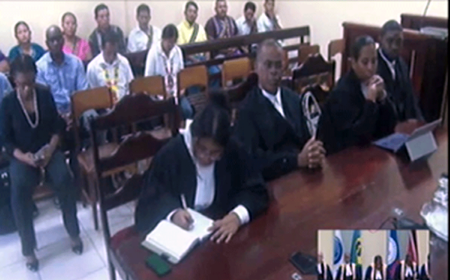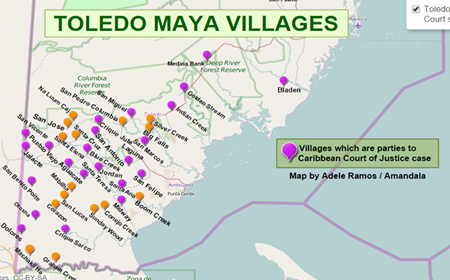BELIZE CITY, Fri. Oct. 30, 2015–In a struggle spanning decades, the Kekchi and Mopan Maya communities of southern Belize continue to push for roughly 800 square miles (or 500,000 acres) to be designated as their homeland—and if the ruling of the Caribbean Court of Justice (CCJ) goes according to the letter of the consent order of April 2015, they should have that homeland demarcated by December 31, 2017.
A landmark CCJ ruling handed down Friday morning has ordered unprecedented reparations to the Toledo Maya for a breach of their constitutional right to protection of the law. That money won’t necessarily be cash-in-hand for the communities, though, as the CCJ has declared that the BZ$300,000 awarded in reparations is for a specified purpose, as set out in section 3 of the consent order which the court handed down 6 months ago, in April.
Pablo Mis, spokesperson of the Maya Leaders Alliance (MLA), which is one of the 25 claimants in the case, told reporters that the CCJ ruling is “…an affirmation that a historical injustice has happened against the Maya people…”
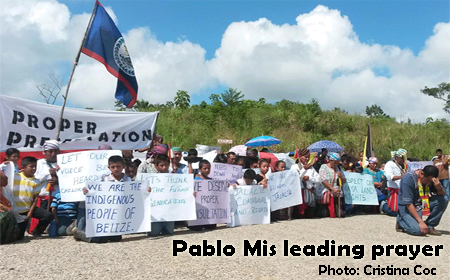
Cristina Coc, another MLA spokesperson, described the ruling as “a very historic moment for Belize.”
“It is certainly an uplifting time for the Maya people, because we recognized that for centuries we have been oppressed and the Caribbean Court of Justice emphasized that… as a result of this oppression, it is the duty and the obligation of the state now to provide redress,” Coc told reporters after the ruling was handed down.
The CCJ decision was also lauded by the Government’s attorney, Denys Barrow, SC, who told journalists: “It’s a lovely decision. I think lawyers, I think academics, I think university students, I think commentators will find a lot in this decision for which to be grateful. I am certainly very grateful for it and I commend the CCJ for their decision.”
“This judgment and the Consent Order of April 22, 2015, undoubtedly represent a form of reparation and satisfaction in the recognition of the customary land tenure rights of the Maya people in southern Belize, and in the judicial finding that those rights have been contravened by the Government of Belize. It also is a form of redress for the centuries of oppression endured by the Maya people since the arrival of the European colonizers,” the CCJ said.
Barrow said that, “…this is not anything which the UDP government has done, the PUP government has done, but this is a result of the state of the law which has prevailed in Belize for centuries.”
The president of the Court of Appeal, Justice Manuel Sosa, had disagreed with the Court of Appeal’s majority decision of 2013 that the litigants had established their indigenousness as the descendants of the pre-colonial inhabitants of the district.
In fact, both political administrations (UDP and PUP) have argued since 2007 that the Toledo Maya are fairly recent migrants from Guatemala who have been trying to stake a claim to southern Belize through novel means in the Maya land rights litigation.
However, in the April 2015 consent order, the Government finally agreed to work towards demarcation and registration of the Maya villages’ rights by December 31, 2017.
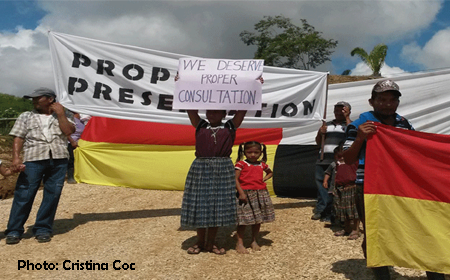
The Maya Atlas: The Struggle to Preserve Maya Land in Southern Belize (1997) says that, “The ultimate dream of the Maya is yet to be achieved—the security of tenure to lands and the creation of a 500,000- acre Maya Homeland.”
“Let us give the Maya their wish and put their system of land ownership on a legal statutory legislative footing…,” Barrow has conceded.
The CCJ has ordered that, “the Government of Belize shall establish a fund of BZ$300,000.00 as a first step … to protect Maya customary land tenure.
“In so doing, we have taken into account that the Government of Belize will be required to engage in considerable expense in order to meet its obligations under the Consent Order.”
In line with that provision of the order, the CCJ requires that the Government, in consultation with the Maya people or their representatives, develop the legislative, administrative and/or other measures necessary to create an effective mechanism to identify and protect the property and other rights arising from Maya customary land tenure, in accordance with Maya customary laws and land tenure practices.
The Maya land rights litigation to have their customary land tenure formally acknowledged began with the claims of Conejo and Santa Cruz in the Toledo District back in 2007—8 years ago — and this is the first time a court with jurisdiction in Belize is awarding monetary compensation to the Maya people.
![]()
![]()
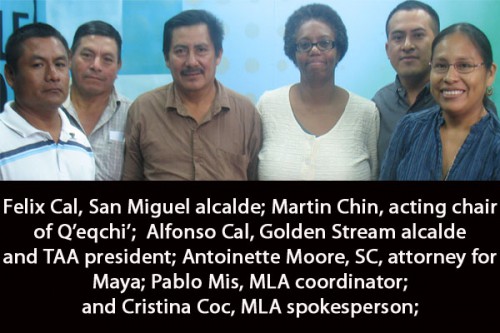
After the Conejo and Santa Cruz victory of 2007, Toledo Maya activists, led by the Toledo Alcaldes Association and the Maya Leaders Alliance filed a much broader claim in June 2008, to which 23 villages were parties.
The villages which were party to the subsequent suit are Golden Stream, Aguacate, Bladen, Blue Creek, Crique Jute, Crique Sarco, Dolores, Indian Creek, Jalacte, Jordan, Laguna, Medina Bank, Midway, Otoxha, Pueblo Viejo, San Antonio, San Benito Poite, San Felipe, San Marcos, San Miguel, San Vincente, Santa Anna, and Santa Theresa. (Click the image below to access map.)
In his 2010 ruling, Conteh ruled in favor of the Maya, and directed the Government to develop a system to accord legal protection to Maya customary land tenure and refrain from any action which might prejudice the rights of the Maya. Conteh did not find that there were any constitutional violations and did not award damages to the Maya.
That ruling was challenged at the Court of Appeal and finally at the CCJ, the country’s highest appellate court.
The Court of Appeal had handed down a split decision in 2013, which lifted the obligation of the Government to take action to establish a system to put into effect customary land tenure. However, all the courts have refused to make an award for damages.
The CCJ said that, “it would be somewhat incongruous for this Court to award damages against the Government for breaching rights which the Maya accept are still to be identified.”
When the CCJ met in Belize this April, the Mayas’ then attorney, Antoinette Moore, SC, who now sits as a Supreme Court Judge, made the case for damages to the tune of $1.5 million, including pecuniary damages of BZ$250,000, with $61,711 for damages to crops in Golden Stream, allegedly by Francis Johnson, now deceased, and non-pecuniary damages similar to the Saramaka people of Suriname, who were awarded US$600,000 in moral damages—which the Maya insist the Government must pay.
The question of monetary awards was the only unresolved issue left after the April 2015 consent order was finalized by the CCJ. The Government of Belize had argued against paying the Maya for historical wrongs that have also been suffered by other ethnic groups in Belize.
The CCJ judges who heard the case were Sir Dennis Byron, president, and justices Nelson, Saunders, Wit, Hayton, Andersonh and Rajnauth-Lee.
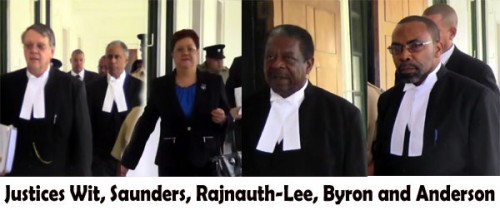
Moore, the lead attorney for the Maya, handed over the case to Monica Coc-Magusson, the sister of MLA/TAA activist Cristina Coc and the first Maya of southern Belize to be called to the Bar.
Appearing with Barrow was his daughter, Naima Barrow, aided by counsel from the Attorney General’s Ministry.
Whereas the Court of Appeal awarded the Maya 65% of their court costs, to be paid by the Government of Belize, the CCJ now orders the Government to pay the Maya 75% of their court costs.
THE CCJ HANDS DOWN DECISION: 2 videos
Read the decision:

